Brookhurst Seafood Bar serves goodness in a bag. Literally. Customers sit down, fasten plastic bibs around their necks, slip on gloves and proceed to rip apart shrimp and lobster swimming in a herb and garlic sauce inside a plastic bag. The goodness doesn’t stop there. Scallops, shrimp and mussels are strewn all over the restaurant’s paper-covered tables. Diners pick and poke at them, chuckling, commiserating and taking selfies with their iPhones which are protected by complimentary zip lock bags.
The owner of the restaurant, Taiwanese-American Wendy Wu (吳欣穎), came up with the concept she calls “grub and chug,” on a trip to Los Angeles last year when she dined at The Boiling Crab, a joint serving seafood in a similar fashion. She wanted the food at Brookhurst to be served with less butter though, and thought it would be helpful to provide gloves and cellphone bags so that diners could still go through their usual routine of uploading food pictures to Facebook and Instagram.
“Today’s generation is phone savvy,” Wu tells the Taipei Times.
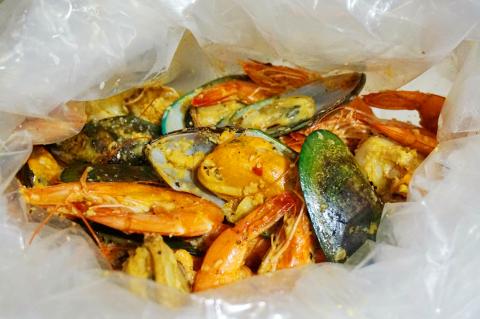
Photo: Dana Ter, Taipei Times
Spending the last decade shuttling back and forth between Taipei and Los Angeles, Wu’s career has spanned from being a radio DJ for ICRT to working retail for fashion brands and singing and performing on stage. Her entire right arm is inked (her husband is a tattoo artist/hipster-vintage store owner) and she has an infectious personality.
Once they had their concept, Wu and the restaurant’s other two partners, Lareine Ko (徐瑞蓮) and Johnny Fei (費聿鋒) spent two months perfecting their “secret sauce” in Wu’s kitchen. For months, her house reeked of herbs, garlic and butter.
“I would wake up in the morning sweating the sauce,” Wu says.
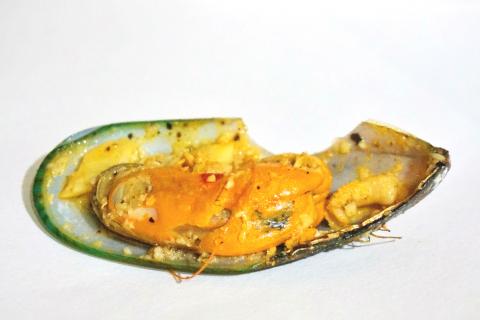
Photo: Dana Ter, Taipei Times
Their efforts paid off because the restaurant, which opened in February, was packed on a Tuesday night when a friend and I dined there. The most popular pick is, of course, the seafood bag, otherwise known as their “BS Combo” where customers choose from an assortment of clams, mussels, white shrimp and Hokkaido scallops. Sauce-wise, the lemon zing is recommended for those with lighter palates, while the Brookhurst bang and Cajun sauces are better suited for those who can take the garlic. The spiciness of the sauce can also be adjusted. The smallest combo, the shrimp and shells (NT$999) feeds two people, while the largest combo, the big catch (NT$5,990), which comes with king crab legs, Boston lobster and a selection of shrimp, is suitable for large groups. There is a generous selection of add-ons on the menu, including veggies and meat. The German and smoked sausages (NT$80), which I had, is a fine choice. However, the meal isn’t complete without something to slop up the sauce with. For that, I ordered slices of French baguette (NT$30).
While many restaurants are judged by their presentation — after all, it’s an important element in the overall dining experience — presentation is least paramount at Brookhurst. Being able to dig into your food with your hands and laying it out on the table without plates has its benefits. For starters, it’s easier to see and feel what you’re eating. Not only that, the entire concept of “grub and chug” taps into our innate childlike propensity to have fun and create a mess.
The mussels, Hokkaido scallops and white shrimp complemented each other well. The mussels were cooked in such a way that they were soft, warm and chewy without a discernible tinge of the rubbery. Lightly seared on the outside, the Hokkaido scallops were warm and mildly cod-like on the inside. By contrast, the white shrimp had a robust natural sweetness and subtle buttery texture which paired well with the more neutral flavors of the mussels and scallops. The German and smoked sausages were a fine addition to the seafood bag, adding a juicy, tender dimension.
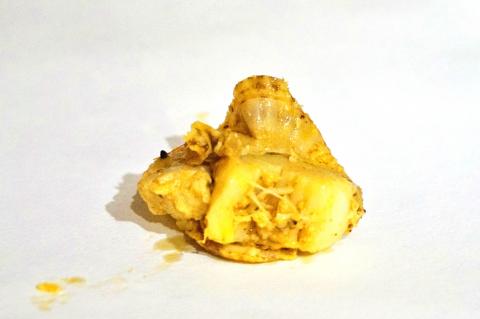
Photo: Dana Ter, Taipei Times
What pulls it all together, however, is the sauce. Neither too thick nor too watery, the Brookhurst bang was a delightful blend of spices, herbs, garlic and butter. There were hints of paprika, pepper and ginger, making it bold and flavorful. I chose my sauce to be mildly spicy, and that gave it just enough zing without having to compete with the freshness of the seafood. The best way for savoring the sauce was dipping my baguette in it and wiping it clean.
Although Brookhurst might be a no frills seafood bar, it is up there when it comes to thrills. Along with clam shells, proper restaurant etiquette is thrown out the window as hungry diners pick their way through seafood bags. While not exactly the best date night spot, in theory, Brookhurst provides a well-suited venue for catching up with friends and being sloppy without being judged.
“I know it’s cliched to say that food brings people together, but it does,” Wu says.
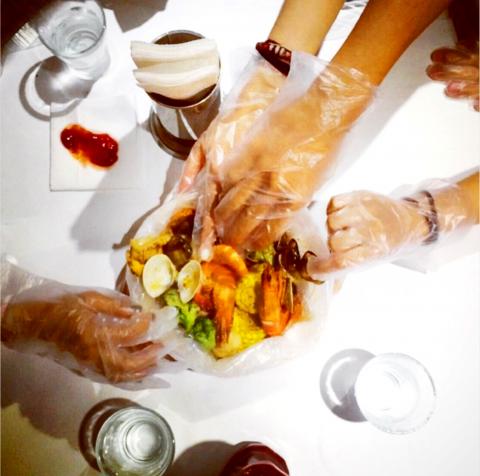
Photo courtesy of Brookhurst Seafood Bar
She adds that she hopes that the restaurant can help bring friends who have drifted apart — because of marriage, babies or whatever reason — back together, bringing a human touch back to the dining experience.
Sure, I thought as I caught a side-glimpse of the two immaculate girls next to me pausing to take selfies with crab claws every 10 seconds.
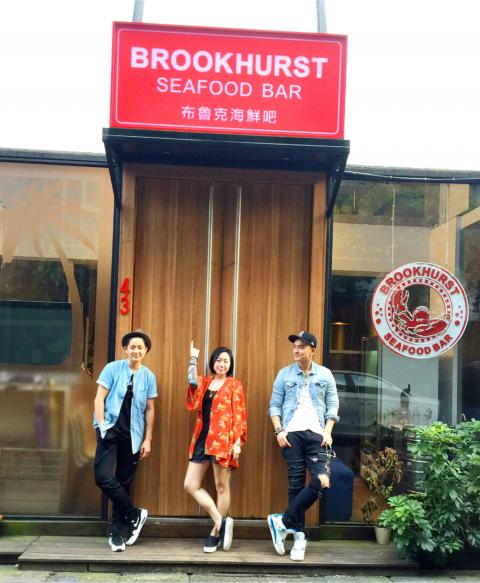
Photo courtesy of Brookhurst Seafood Bar

As Taiwan’s second most populous city, Taichung looms large in the electoral map. Taiwanese political commentators describe it — along with neighboring Changhua County — as Taiwan’s “swing states” (搖擺州), which is a curious direct borrowing from American election terminology. In the early post-Martial Law era, Taichung was referred to as a “desert of democracy” because while the Democratic Progressive Party (DPP) was winning elections in the north and south, Taichung remained staunchly loyal to the Chinese Nationalist Party (KMT). That changed over time, but in both Changhua and Taichung, the DPP still suffers from a “one-term curse,” with the

William Liu (劉家君) moved to Kaohsiung from Nantou to live with his boyfriend Reg Hong (洪嘉佑). “In Nantou, people do not support gay rights at all and never even talk about it. Living here made me optimistic and made me realize how much I can express myself,” Liu tells the Taipei Times. Hong and his friend Cony Hsieh (謝昀希) are both active in several LGBT groups and organizations in Kaohsiung. They were among the people behind the city’s 16th Pride event in November last year, which gathered over 35,000 people. Along with others, they clearly see Kaohsiung as the nexus of LGBT rights.

Jan. 26 to Feb. 1 Nearly 90 years after it was last recorded, the Basay language was taught in a classroom for the first time in September last year. Over the following three months, students learned its sounds along with the customs and folktales of the Ketagalan people, who once spoke it across northern Taiwan. Although each Ketagalan settlement had its own language, Basay functioned as a common trade language. By the late 19th century, it had largely fallen out of daily use as speakers shifted to Hoklo (commonly known as Taiwanese), surviving only in fragments remembered by the elderly. In

Dissident artist Ai Weiwei’s (艾未未) famous return to the People’s Republic of China (PRC) has been overshadowed by the astonishing news of the latest arrests of senior military figures for “corruption,” but it is an interesting piece of news in its own right, though more for what Ai does not understand than for what he does. Ai simply lacks the reflective understanding that the loneliness and isolation he imagines are “European” are simply the joys of life as an expat. That goes both ways: “I love Taiwan!” say many still wet-behind-the-ears expats here, not realizing what they love is being an